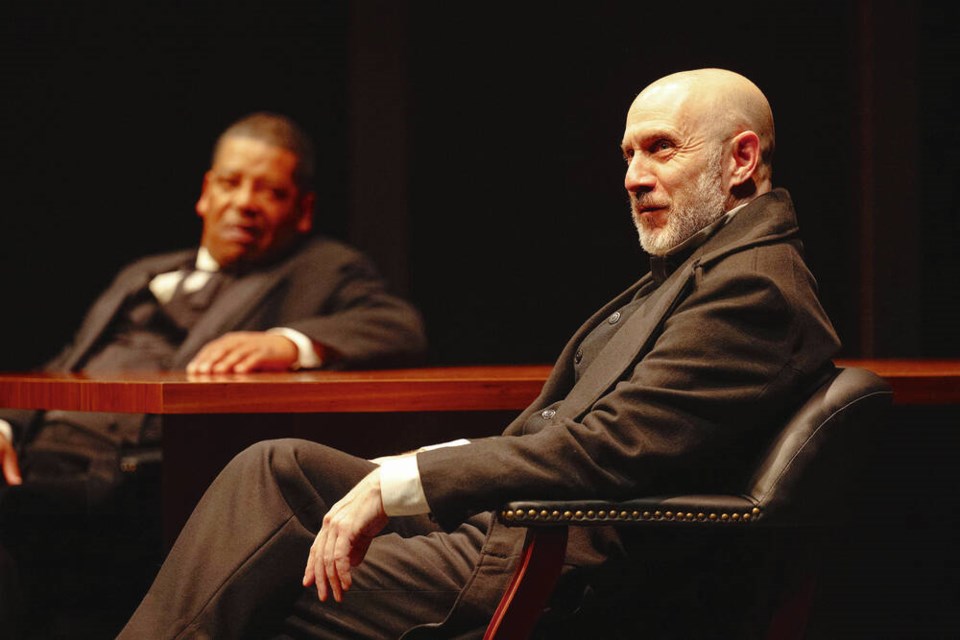The Lehman Trilogy delves into the murky heart of American capitalism and — wonder of wonders! — finds it wanting.
Now playing at the Belfry Theatre, some may find this three-hour-plus opus — a hefty chunk of docu-drama spanning 164 years — intriguing and perhaps even spell-binding. Others may wonder what all the fuss is about.
There’s no question the Belfry’s production of this Tony Award-winning show, deftly directed by Michael Shamata, is well acted. Another plus: Shawn Kerwin’s slick glass-and-steel set of a modern corporate board room is nothing short of stupendous.
The real-life Lehmans were three Jewish-German immigrants who founded a humble dry goods store in Montgomery, Alabama, during the mid-1800s. Through determination, talent and iron-clad chutzpah, they evolved into titans of American industry and banking.
The Lehmans certainly achieved the American dream — but at what cost? That’s the central question posed by Italian playwright/novelist Stefano Massini, whose sprawling three-act epic is translated into English by Ben Power.
Garbed in formal period dress throughout, Brian Markinson, Celine Stubel and Nigel Shawn Williams portray the Lehman brothers as well as a gaggle of lesser characters. We meet brother Heyhum (Markinson) upon his arrival in New York Harbour in 1844 as a fresh immigrant. A port official, confused by the foreign name, promptly dubs him Henry. The acquiescent Lehman cannily accepts his new moniker and is soon joined in America by his younger brothers Mayer (Stubel) and Emanuel (Williams).
At first the Lehmans sell clothing and fabric. They then become cotton brokers, buying from southern plantations and managing to ride out the disruptive tide of the Civil War. The Lehmans embrace the concept of being “middle-men” adept at anticipating the wants and desires of the public. The brothers do awfully well, eventually relocating to New York City and becoming one of the city’s powerful banking families. Ultimately, The Lehman Trilogy takes us to the collapse of the family empire in 2008 (in fact, by the time the company fell apart, the last remaining Lehman had long since departed).
Unsurprisingly, playwright Massini suggests there’s a price to be paid for such mammoth success. Amongst other things, the Lehman brothers lose touch with their Judaism. A traditional extended period of mourning, for example, is reduced to a few business-like minutes of silence. Everything seems transactional — when one Lehman considers future marriage prospects, he rates each woman on a scale of a hundred.
(Some critics have suggested The Lehman Trilogy deals in antisemitic tropes. This wasn’t my impression. Certainly the brothers are Jewish, yet this seems more of a biographical element within a play examining the immigrant experience and the “American dream” in a more general sense. Perhaps anticipating criticism, Shamata appears to have cast with universality in mind: Williams is black, and “brother” Mayer is played by Stubel, who is a woman.)
One curious thing about The Lehman Trilogy is the lack of dialogue in this wordy script. Characters rarely speak or interact with one another; instead, the brothers are content to narrate their story. This tell-rather-than-show approach gives the proceedings an abstract feel that, at times, can border on the antiseptic.
Massini endeavours to humanize his characters by displaying a writerly knack for detail. Tellingly, the door to their office is afflicted with a “sticky” handle. Each of the brothers has a cute nickname — Henry is “the Head,” Emanuel is “the Arm” and little brother Mayer is “the Potato.” Yet how much do we empathize with these people? Certainly we are intrigued, entertained and impressed by the Lehmans — how much we truly care about them is another matter.
Any such lack is not for want of trying on the part of the cast (who often spin on a revolving stage). On Friday night, Markinson as Henry provided a welcome vivaciousness and low-key charisma — he was the glue holding everything together. Stubel gave Mayer a subtle sense of mystery — a quality that’s something of a trademark for this compelling actor. Williams’ best moments came when Emanuel cast aside dourness to movingly describe a nightmare in which trains rocket through the sky.
Massini examines business practice with bold strokes and keenly observed attention to detail. And he reminds us — once again — that there’s more to life than making a buck. Admirable enough, I suppose.
Nonetheless, despite its notable ambition and scope, I’m not convinced The Lehman Trilogy has much new or profound to say about the age-old quest for money and power. It lacks the power and potency of a work like Death of a Salesman, which skewers capitalism while taking us on a highly original journey of gut-wrenching heartbreak.
The Lehman Trilogy continues at the Belfry Theatre to May 19.



